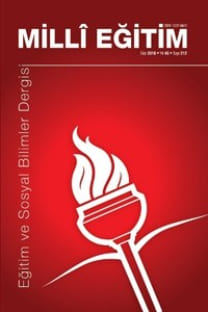2015 TÜRKÇE DERSİ ÖĞRETİM PROGRAMINA GÖRE 5-8. SINIF ÖĞRENCİLERİNİN KELİME SERVETLERİNİ GELİŞTİRMEYE YÖNELİK BİR DEĞERLENDİRME
Bu çalışma, ortaokul düzeyindeki öğrencilerin kelime servetlerinin nasıl arttırılabileceğini ortaya koymak amacıyla yapılmıştır. Çalışmada öğrencilerin aynı sınıfta eğitim almalarına rağmen farklı sosyoekonomik düzeyleri, bilişsel ve duyuşsal hazırbulunuşlukları olduğu dikkate alınarak örnek kelime etkinlikleri hazırlanmıştır. Kelime etkinliklerinde, güncel Türkçenin söz varlığı göz önüne alınmıştır. Literatür taramasına dayalı betimleyici türdeki bu niteliksel çalışmada kelime etkinlikleri anlamsal yönden temel, yan, mecaz, eş, sesteş, zıt, somut, soyut, olarak ele alınmış, kelimelerin eşdizimleri ve çağrışımsal alanlarının ders içinde nasıl kullanılacağına dair açıklamalarda bulunulmuştur. Kelime servetini geliştirmede, dilin iletişimsel boyutu temel alınmıştır. Kelimelerin kişisel deneyimlerle bağdaştırılmadığında aktif kelime servetinin geliştirilmesinin zor olması gerçeğinden hareketle, öğrenciler için etkin bir kelime kazanımı süreci planlanmıştır. Bu plan dâhilinde öğrenci ve öğretmen rolleri belirlenerek kelime servetini geliştirmeye yönelik önerilerde bulunulmuştur
Anahtar Kelimeler:
Türkçe eğitimi, kelime serveti, kelime etkinlikleri
AN ASSESSMENT OF IMPROVING VOCABULARY KNOWLEDGE OF 5-8TH GRADES STUDENTS ACCORDING TO THE 2015 TURKISH LESSON CURRICULUM
This study has done to explore the activities and ways to build the vocabulary of 5-8th class students In the study, sample vocabulary practices and activities were designed taking the differences in cognitive and sensual readiness, socioeconomic status into account, even though these students were in the same classroom. In vocabulary activities, contemporary Turkish and its lexicon were taken into account. Based on the type of descriptive literature, this qualitative study categorizes vocabulary as semantically connotative, concrete, abstract, central meaning, allaphones, synonymous, antonymous, or metaphorical and explains how to implement the collocations and contextual aspects of the words into the lesson. When improving vocabulary, communicational functions of the language are taken as a basis. Considering the fact that it is harder to improve one’s vocabulary without personal connections to the context of the words, active involvement of the learners was sought in the way of improving vocabulary. In this scheme, roles of learners and teachers were defined and ways to improve vocabulary were suggested.
Keywords:
Turkish education, vocabulary, vocabulary activities,
- ISSN: 1302-5600
- Yayın Aralığı: Yılda 4 Sayı
- Başlangıç: 1973
- Yayıncı: Milli Eğitim Bakanlığı
Sayıdaki Diğer Makaleler
ÖĞRENCİLERİN YAZILI ANLATIMLARINDAKİ SÖZ VARLIĞINI BELİRLEMEYE YÖNELİK ÇALIŞMALARDA YÖNTEM SORUNU
ORTAÖĞRETİM ÖĞRENCİLERİNİN SÖZLÜKLERE YÖNELİK TUTUMLARI
YABANCILAR İÇİN TÜRKÇE DERS KİTAPLARINDAKİ SÖZCÜKLERİN KULLANIM SIKLIĞI VE YAYGINLIĞI
ORTAOKUL ÖĞRENCİLERİNİN KAVRAMLARI ANLAMLANDIRMA EĞİLİMLERİ
H Ömer BEYDOĞAN, Zeynel HAYRAN
TWEETS DERLEMİ SOSYAL MEDYADAN DERLEM OLUŞTURMAK
SALÂH BİRSEL’İN “ŞINGIR MINGIR” SÖZCÜKLERİ -DEYİMLER
MESLEKİ DİLİN SÖZ VARLIĞI VE TERİM
Kemalettin DENİZ, Nurullah ALKOL, Türkçe Öğretmeni
ÇOCUK KİTAPLARINDA ORTAK SÖZ VARLIĞI UNSURLARI ÜZERİNE BİR DEĞERLENDİRME
